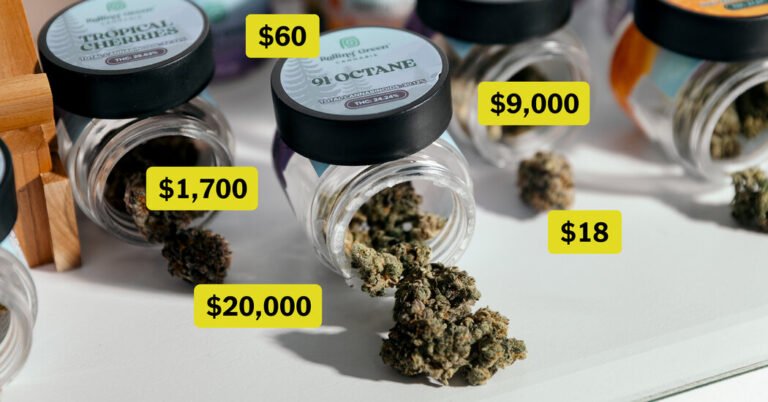
It costs to play by the rules.
That’s why 52 percent of Terp Bros’s income after the costs of products goes to federal, state and local income taxes. Were the dispensary a traditional business, it would pay about 36 percent, according to the accountant, Justin Ash of Accounting Buds.
Customers also pay a higher sales tax on cannabis (13 percent, or an extra $7.80 on those jars of 91 Octane) than on alcohol (8.875 percent).
And legal stores have faced competition from the unregulated market, which exploded after recreational cannabis was legalized in 2021. A slow licensing process, tight rules and a lack of state-promised financial support for legal sellers initially helped illicit retailers gain an advantage. In recent months the authorities have cracked down on illegal shops, even as thousands remain in business.
Still, sales have risen at licensed dispensaries, and regulators have proposed easing bans on discounts and loyalty programs to help attract customers. The state also expanded licensing beyond the initial pool of people with cannabis convictions and business experience.
To stay afloat, Mr. Rivera, 37, said, “you have to be very lean.”
Terp Bros sells every product — from drinks to edibles to smokable flower, all of which must be prepackaged — for about twice the wholesale price, a common industry markup to defray the costs of a legal business. Prices vary based on quality, availability, demand and seller discretion.
Before tax, legal dispensary customers pay an average of $7.62 more for those jars of 91 Octane than for what’s available on the unregulated market, said James Cosgrave, an owner of Rolling Green Cannabis, the farm that sells them to Terp Bros. Each jar costs almost $30 wholesale, plus a 9 percent tax. The farm pays for glass jars (which must be childproof), lab testing and tracking software.
Two years ago, Mr. Rivera and Mr. Cottone applied for the state’s first recreational dispensary licenses. After waiting months, they got two. Applications and licenses cost them $8,000 before lawyers’ fees.
Their 2,730-square-foot storefront’s location on a bustling restaurant corridor was a draw. “We stood outside for three days to make sure the foot traffic was right,” Mr. Rivera said.
They hoped the free months on their lease would give them time to make money before rent was due. But their opening was delayed by a judge who halted licensing.
Mr. Rivera, who spent years in prison on weed-related charges before starting a construction safety business in 2018, told the court that he would go bankrupt. In October, the judge said he could proceed.
They spent $300,000 to open, while other dispensaries in the city spent over $1 million. Among the costs: renovations ($75,000), website design ($8,000) and showroom cabinetry and displays ($45,000).
There were hiccups. Mr. Rivera paid a company $14,200 to put air-conditioners in every room. But he had to spend another $1,500 when he realized safety switches were missing. He pays $500 every three months for maintenance that includes vacuuming filters, refilling coolant and cleaning coils.
His main concern is the pressure to lower prices as the market expands. He’s trying to get ahead of it by negotiating discounts with suppliers for large orders. Still, last month Terp Bros made $850,000 in sales, Mr. Rivera said.
Mike Flefleh, 76, a recent customer, said he doesn’t mind paying extra.
“I like the security of getting something that I know where it’s coming from and what’s in it,” he said.
Produced by Eden Weingart, Eve Edelheit and Dagny Salas. Development by Gabriel Gianordoli and Aliza Aufrichtig.